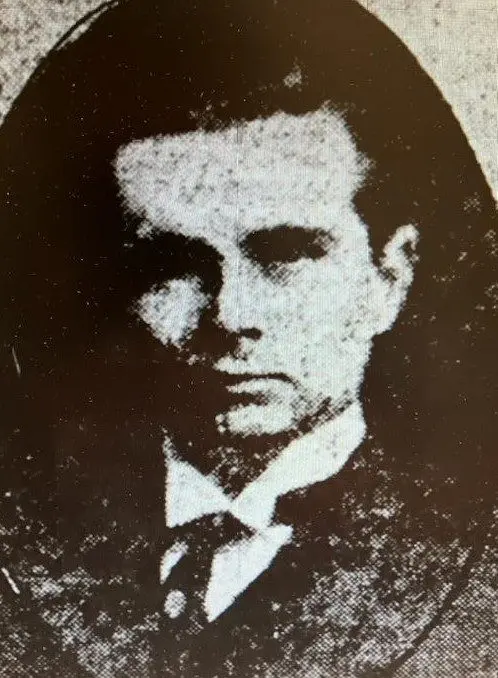
Former Louisiana mayor dies after shooting
Editor’s note: Following is the third part of a story series by contributing writer Brent Engel.
In just two days, Fred Wilkins went from escaping blame to being accused of premeditated murder.
Further scrutiny by Pike County Prosecuting Attorney Thomas Berger McGinnis was the key.
Former Louisiana Mayor Alten Walker was shot in the stomach the night of March 2, 1915. He and Wilkins said they were examining a revolver together when it accidentally discharged. Walker died two days later.
A coroner’s jury on March 8 did not issue a verdict. That didn’t stop McGinnis from digging deeper.
One of 11 children, the 52-year-old farmer’s son had studied law with Champ Clark and taught school in Curryville, Ashley and Cyrene. He was a seasoned prosecutor whose reputation for thoroughness was the bane of defendants.
“He has much natural ability, but is withal a hard student and is never contented until he has mastered every detail of his cases,” according to the book “Centennial History of Missouri.”
Nonetheless, McGinnis faced hurdles in the death of Walker. Wilkins and his wife, Diana, refused to testify, and the inconclusive finding of the coroner’s jury left no solid evidence to support criminal charges.
McGinnis urged anyone with information to step forward, and on March 10 he got a break. Mississippi River boat operator William Brazier filed a complaint claiming Wilkins had shot Walker “on purpose and with malice aforethought.”
Brazier had testified at the inquest, saying he saw Wilkins and a disheveled Walker going down Third Street toward the former mayor’s real estate office the night of the shooting. Brazier lived on North Fourth Street not far from Wilkins, but it wasn’t clear if the two were acquainted.
Brazier provided no other details in his complaint, but it was enough for Pike County Judge Ellis Omohundro to issue an arrest warrant. Wilkins was picked up the next day by Louisiana Constable George Jennings.
The suspect “quietly submitted to the arrest and maintained the silence in regard to the case that he has from the start,” the Pike County News reported.
Wilkins was released on $3,000 bond and a preliminary hearing was set for March 17.
“The persistence of McGinnis, in the face of so many difficulties, indicates that he will prosecute the case vigorously and solve the mystery in which, to a great extent, the killing of Walker is still shrouded,” the St. Louis Post-Dispatch said.
McGinnis was “well-pleased with the progress being made” and “hoped the affair would have a clear and satisfactory explanation at the preliminary,” the News offered.
Brazier was skewered at the hearing by Wilkins’ attorney, Ras Pearson. One question was if Brazier had recently been indicted for allegedly brawling with a man.
“You ought to know,” Brazier shot back. “You were my attorney.”
There was still no firm motive in the shooting of Walker, who was on the staff of Missouri Gov. Elliott Major. One that had been suggested was Wilkins and his wife were blackmailing Walker for money and set him up. The story went that the couple lured Walker to their home with the promise of sex and shot him when he refused to cooperate.
It seemed plausible after newspapers found that Wilkins was on the hook for an $800 loan in Hannibal. Today, that would be $25,000.
Then again, Walker was in financial straits, too. He was fighting a $10,000 judgment – $312,000 now – for allegedly attacking stenographer Evelyn Ogden at his office the previous year.
There was a bit of humor amid the tragedy. It seems Wilkins and Walker weren’t the only ones with money worries.
McGinnis said it would be more convenient if the preliminary hearing took place in Louisiana because all the witnesses lived there. Omohundro did not object, but noted it was financially impractical to move the court from Bowling Green.
McGinnis offered to provide a meal of stewed chicken and dumplings, and Dr. James W. Crewdson – who had cared for Walker – agreed to pay the judge’s round-trip train fare of 83 cents, or about $25 now.
Omohundro made it to Louisiana, but the case would ultimately be heard by Circuit Judge Edgar Woolfolk. A trial was postponed twice before finally being set for January 1916 at the Bowling Green Opera House, which was put into use after the county courthouse burned in October 1915.
The St. Louis Globe-Democrat said there was “a prevalent belief” that Wilkins would never face justice. The News hit the nail on the head when it wrote that “all predictions are only problematical.”
Next time: Predictably unpredictable.
CUTLINE FOR PHOTO:
A newspaper image of Fred Wilkins.